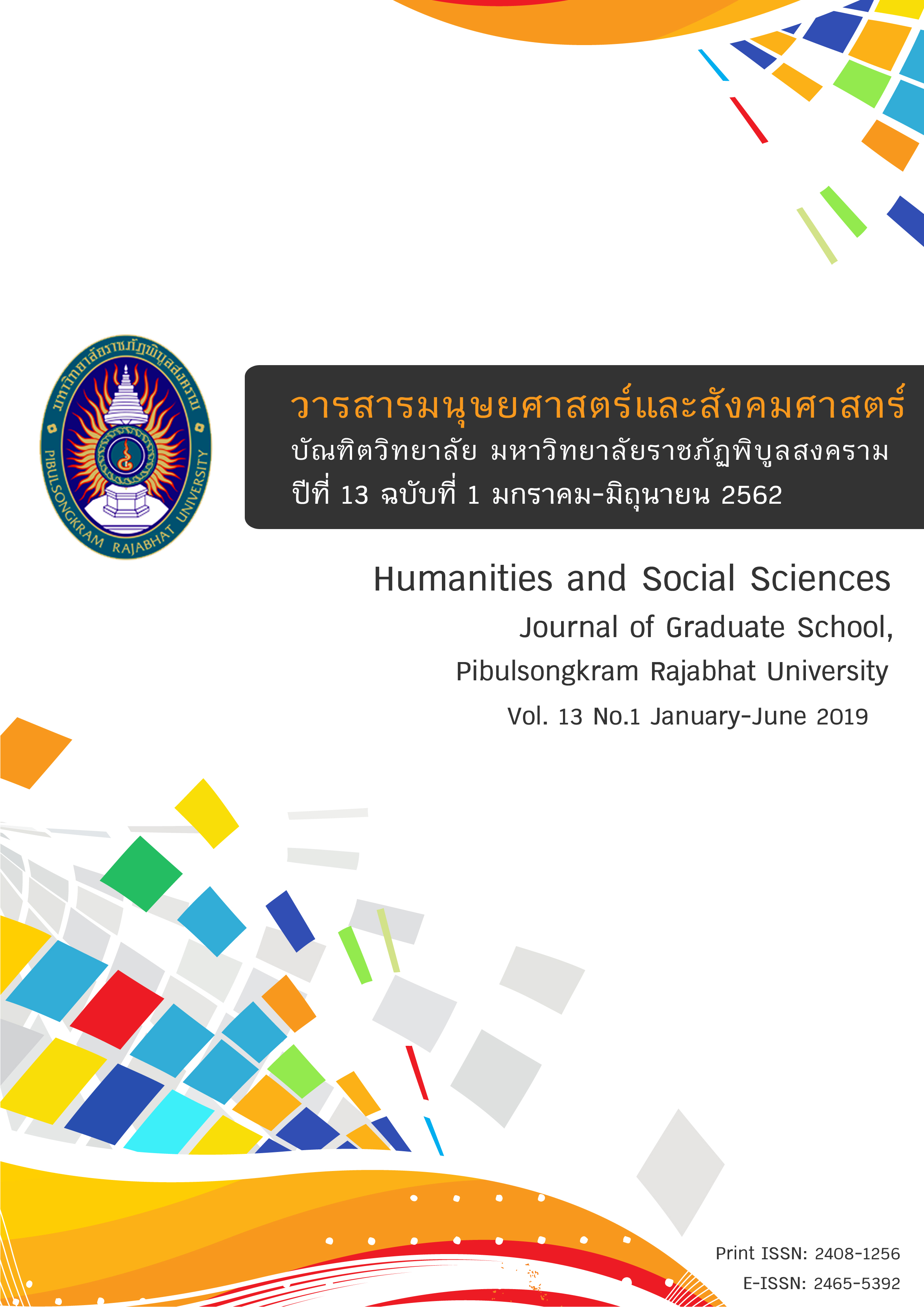Empowerment of Teachers to Drive the Model Integrating Water Conservation to Schools' Khlong Ta Nae, Phatthalung Province
Keywords:
Teacher’s empowerment, Water conservation consciousnessAbstract
The purposes of the Empowerment of teachers to drive the model integrating water conservation to Schools' Khlong Ta Nae, Phatthalung Province were 1) to develop process of empowering teachers to drive integrated model of water conservation consciousness to schools at Khlong Tanae Basin Phatthalung Province, 2) to study the accomplishment of empowering teachers to drive integrated model of water conservation consciousness to schools at Khlong Tanae Basin Phatthalung Province. Nine teachers and one hundred and twenty students from Four schools located in Khlong Tanae Basin Phatthalung province were voluntarily chosen for this research. Research tools and data collections were criteria scores for skills of water conservation learning management and students' water conservation measurement. Percentage and Wilcoxon signed rank test were used for data analysis The research findings were as follows:
1) The results of teacher empowerment to drive the model of integrating water conservation consciousness to schools of Khlong Tanae Phatthalung Province consisted of concepts of process and enhancing process. The processes consisted of 1) mission allocation, 2) inspection of original sources, 3) planning development, 4) controlled and supported follow-up and 5) presentation of efficient feedback evidence and guidelines for correct and appropriate principles with useful received context development and possibility of application were at a high to the highest levels.
2) The results of the study accomplishment of teacher empowerment to drive the model of integrating water conservation consciousness to schools of Khlong Tanae Phatthalung Province were found that teachers had the skills of learning management for water conservation development at the developing level of 66.67 and the standard level of 33.33 by having skills of learning management higher than before being received the development with statistical significance at .01 and students had water conservation after receiving higher than before participating the learning management for developing water conservation with statistical significance at .01 both overall and each school.
References
กฤติยา วงศ์ก้อม. (2547). รูปแบบการพัฒนาครูด้านการประเมินการเรียนรู้ตามแนวคิดการประเมินแบบเสริมพลังอำนาจที่สอดคล้องกับพระราชบัญญัติการศึกษาแห่งชาติ พุทธศักราช 2542 (วิทยานิพนธ์ปริญญาดุษฎีบัณฑิต). จุฬาลงกรณ์มหาวิทยาลัย, กรุงเทพฯ.
ธัญญรัศม์ จอกสถิต. (2553). โมเดลการพัฒนาการปฏิบัติงานครู : การประยุกต์ใช้แนวคิดการประเมินครูที่เน้นการปฏิบัติงานเป็นฐานและการประเมินแบบเสริมพลังอำนาจ (วิทยานิพนธ์ปริญญาดุษฎีบัณฑิต). จุฬาลงกรณ์มหาวิทยาลัย, กรุงเทพฯ.
โรสนี จริยะมาการ. (2557). การสร้างความสามารถในการประเมินของครูเพื่อพัฒนาทักษะการสื่อสารภาษาไทยของนักเรียนในสามจังหวัดชายแดนภาคใต้โดยใช้แนวคิดประเมินแบบเสริมพลังอำนาจและการสอนโดยใช้การประเมินเป็นฐาน (วิทยานิพนธ์ปริญญาดุษฎีบัณฑิต). จุฬาลงกรณ์มหาวิทยาลัย, กรุงเทพฯ.
สมพงศ์ ปั้นหุ่น. (2548). การพัฒนาแบบตรวจสอบรายการประเมินแบบเสริมพลังอำนาจ เพื่อพัฒนาทักษะ
การประเมินของครูและนักเรียน (วิทยานิพนธ์ปริญญาดุษฎีบัณฑิต). จุฬาลงกรณ์มหาวิทยาลัย, กรุงเทพฯ.
Fetterman, D. M. (1996). Empowerment evaluation: An introduction to theory and practice. In D. M. Fetterman, S. Kaftarian, & A. Wandersman (Eds.), Empowerment evaluation: Knowledge and tools for self-assessment and account- ability. Thousand Oaks, CA: Sage.
Fetterman, D. M. (2001). Foundations of empowerment evaluation. Thousand Oaks, CA: Sage.
Krathwohl, D. R., Bloom, B. S., & Masia, B. B. (1964). Taxonomy of educational objectives: Handbook II: Affective domain. New York: David McKay.
Stufflebeam, D. L., & Shinkfield, A. J. (2007). Evaluation theory, models and applications. San Francisco, CA Jossey-Bass.
Downloads
Published
How to Cite
Issue
Section
License
Any articles or comments appearing in the Journal of Humanities and Social Sciences, Rajabhat Phibulsongkram University, are the intellectual property of the authors, and do not necessarily reflect the views of the editorial board. Published articles are copyrighted by the Journal of Humanities and Social Sciences, Rajabhat Phibulsongkram University.









